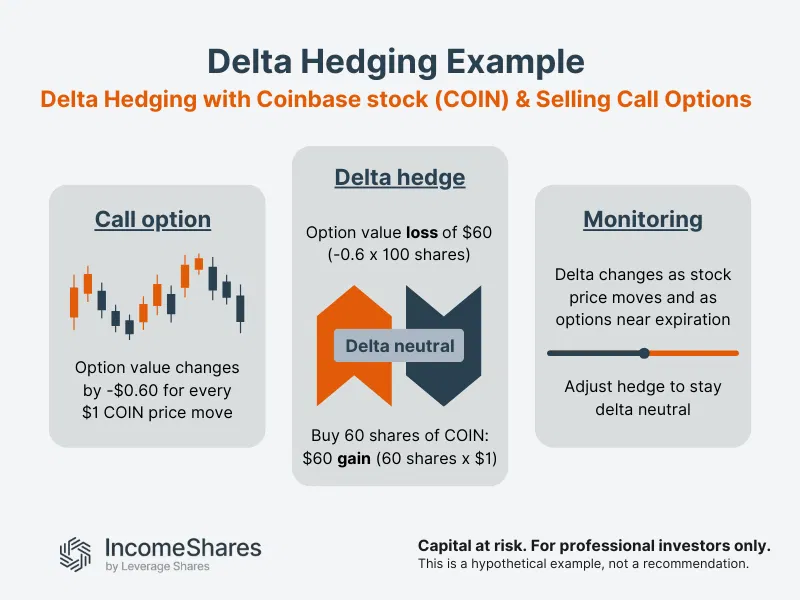
Author
Jonathan Hobbs, CFA
Date
08 Jan 2025
Category
Martket Insights
Delta Hedging Explained: Basic Guide For Options Traders
Your capital is at risk if you invest. You could lose all your investment. Please see the full risk warning here.

Delta hedging is a strategy options traders use to manage risk. It can help balance gains and losses when the price of an underlying asset moves. This guide will explain how delta hedging works and why it matters in options trading.
What is delta hedging?
Delta measures how much an option’s price is expected to change with a $1 move in the underlying stock (or asset). Think of it as a measure of the option’s price sensitivity to the stock.
Delta hedging means adjusting your portfolio to offset that sensitivity. The goal is to reduce the impact of stock price moves on your option position.
For example, if a trader owns a call option with a delta of 0.5, the option’s price will move by $0.50 for every $1 change in the stock price. To delta hedge this exposure, they might sell 0.5 shares of the stock per option contract. This approach can help reduce their delta exposure to zero temporarily, which might be useful in times of market volatility.
Keep in mind, delta changes as stock prices move and as options get closer to expiration. That means delta hedging isn’t a set-and-forget strategy – it’s something traders need to actively manage.
Why use delta hedging?
Delta hedging can help traders:
Manage risk: It can reduce exposure to sudden price shocks.
Stabilize income: It can help maintain steady income when combined with options strategies like selling calls or puts.
Limit volatility: By offsetting price sensitivity, it can smooth portfolio performance.
Delta hedging can be used in options-based ETPs (exchange-traded products) that aim to generate income, like those offered by IncomeShares EU. By managing delta exposure, these products aim to stabilize returns and manage the effects of price movements in the underlying stocks.
Example: delta hedging with Coinbase stock (COIN)
Suppose a trader has a position in Coinbase stock (COIN) and sells a call option as part of a covered call strategy. Here’s how delta hedging might work:
1. The call option:
Strike price: $300
Current COIN price: $270
Delta: -0.6 (selling a call option creates a negative delta, as the option price decreases when the stock price rises).
2. The delta hedge:
The trader buys 60 more shares of COIN to hedge the -0.6 delta (-0.6 × 100 shares per option contract).
If COIN rises $1 to $271, the option loses $0.60 per share (100 × -$0.60 = -$60), but the long stock position gains $60.
The net effect is neutral, as the gain from the stock offsets the loss from the option.
3. Monitoring and adjusting the hedge to stay “delta neutral”:
As COIN’s price moves, delta changes.
Delta can change more rapidly as options get closer to expiration—a concept influenced by gamma.
The trader will need to monitor and adjust the delta hedge by buying or selling shares to stay delta neutral.

This strategy could potentially reduce the impact of COIN’s price moves on the trader’s portfolio – while seeking income from selling call options.
Delta hedging and IncomeShares EU products
At IncomeShares EU, our options ETPs involve managing delta exposure. For example:
Covered call strategies: Selling call options to generate income while holding the underlying asset naturally manages delta exposure.
Put-writing strategies: Selling puts to earn premiums while managing risk with cash-secured positions also adjusts delta as market conditions change.
Active delta hedging can complement these strategies to mitigate the effects of sharp price swings in the underlying assets. This approach can potentially help stabilize income generation in options ETPs.
Key takeaways
Delta hedging is a strategy to balance the impact of price moves in a portfolio.
It involves adjusting stock positions to offset an option’s delta.
It can be useful in strategies that focus on income generation with options.
Example: In a covered call strategy with Coinbase stock, buying additional shares can potentially hedge delta and manage risk.
Your capital is at risk if you invest. You could lose all your investment. Please see the full risk warning here.
Related Products:
Strategy
Cash-Secured Put + Equity
Distribution Yield
61.57%
Strategy
Cash-Secured Put + Equity
Distribution Yield
51.33%
Strategy
Cash-Secured Put + Equity
Distribution Yield
36.78%
